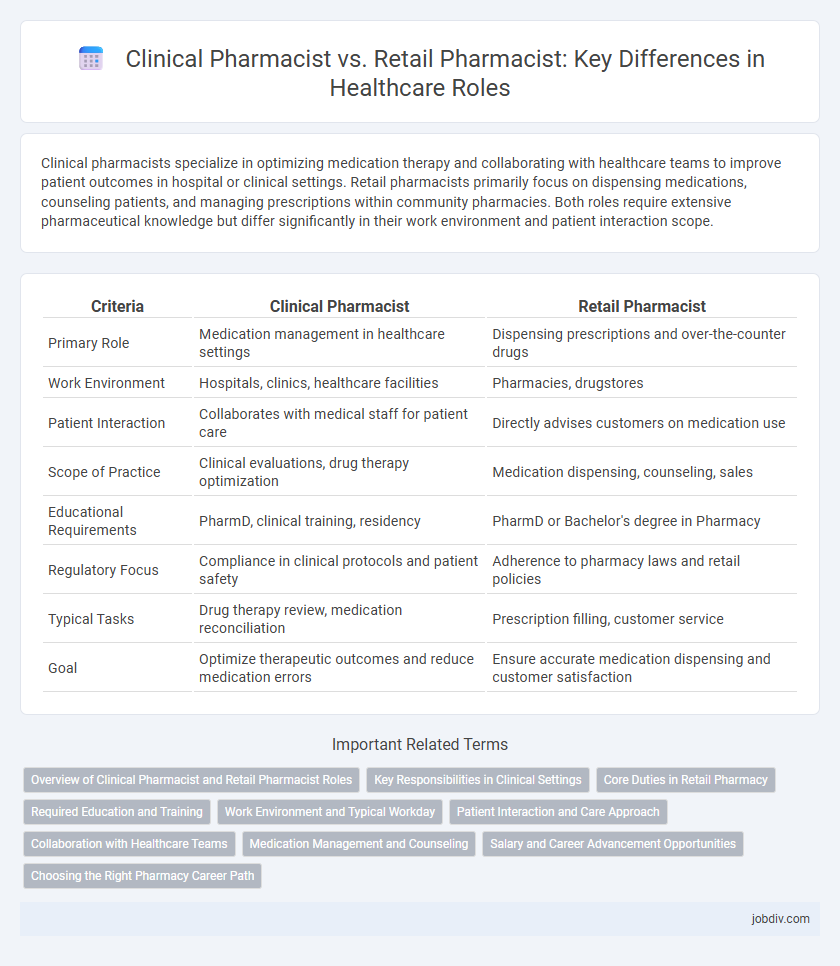Clinical pharmacists specialize in optimizing medication therapy and collaborating with healthcare teams to improve patient outcomes in hospital or clinical settings. Retail pharmacists primarily focus on dispensing medications, counseling patients, and managing prescriptions within community pharmacies. Both roles require extensive pharmaceutical knowledge but differ significantly in their work environment and patient interaction scope.
Table of Comparison
| Criteria | Clinical Pharmacist | Retail Pharmacist |
|---|---|---|
| Primary Role | Medication management in healthcare settings | Dispensing prescriptions and over-the-counter drugs |
| Work Environment | Hospitals, clinics, healthcare facilities | Pharmacies, drugstores |
| Patient Interaction | Collaborates with medical staff for patient care | Directly advises customers on medication use |
| Scope of Practice | Clinical evaluations, drug therapy optimization | Medication dispensing, counseling, sales |
| Educational Requirements | PharmD, clinical training, residency | PharmD or Bachelor's degree in Pharmacy |
| Regulatory Focus | Compliance in clinical protocols and patient safety | Adherence to pharmacy laws and retail policies |
| Typical Tasks | Drug therapy review, medication reconciliation | Prescription filling, customer service |
| Goal | Optimize therapeutic outcomes and reduce medication errors | Ensure accurate medication dispensing and customer satisfaction |
Overview of Clinical Pharmacist and Retail Pharmacist Roles
Clinical pharmacists specialize in optimizing medication therapy and providing direct patient care in healthcare settings such as hospitals and clinics, collaborating closely with physicians to ensure safe and effective drug use. Retail pharmacists primarily dispense medications, counsel patients on prescription and over-the-counter drugs, and manage pharmacy operations in community or commercial pharmacy environments. Both roles require comprehensive pharmaceutical knowledge but differ in focus, with clinical pharmacists emphasizing therapeutic outcomes and retail pharmacists prioritizing medication accessibility and patient education.
Key Responsibilities in Clinical Settings
Clinical pharmacists specialize in optimizing medication therapy by collaborating directly with healthcare teams to develop patient-specific treatment plans, monitor drug efficacy, and manage adverse effects. They conduct comprehensive medication reviews, ensure the safe use of prescriptions, and provide drug information and education to both patients and medical professionals in hospital or clinical environments. Retail pharmacists primarily focus on dispensing medications, counseling patients on drug use, and managing over-the-counter product recommendations within community pharmacy settings.
Core Duties in Retail Pharmacy
Retail pharmacists primarily focus on dispensing prescription medications, counseling patients on proper drug usage, and managing over-the-counter medication sales. They play a crucial role in monitoring for drug interactions and ensuring patient safety by verifying prescriptions and providing medication adherence support. Retail pharmacists also handle inventory management, insurance claims processing, and offer vaccination services within the community pharmacy setting.
Required Education and Training
Clinical pharmacists require a Doctor of Pharmacy (PharmD) degree followed by specialized residency training, often including a Postgraduate Year 1 (PGY1) and sometimes a Postgraduate Year 2 (PGY2) in clinical pharmacy or specific specialties. Retail pharmacists also need a PharmD degree but typically do not require extensive residency training, focusing instead on licensure requirements such as passing the North American Pharmacist Licensure Examination (NAPLEX) and state-specific exams. Both roles demand strong foundational knowledge in pharmacology, but clinical pharmacists have additional training to optimize medication therapy in hospital or clinical settings.
Work Environment and Typical Workday
Clinical pharmacists typically work in hospitals or healthcare settings, collaborating directly with physicians and other healthcare professionals to optimize patient medication therapies. Their workday often involves reviewing patient records, conducting medication therapy management, and advising on drug interactions and side effects. Retail pharmacists primarily work in community pharmacies, focusing on dispensing prescriptions, counseling patients on over-the-counter medications, and managing inventory within a fast-paced customer service environment.
Patient Interaction and Care Approach
Clinical pharmacists provide individualized medication therapy management through direct collaboration with healthcare teams, focusing on optimizing patient outcomes in clinical settings. Retail pharmacists emphasize dispensing medications and offering counseling on drug use, side effects, and over-the-counter options, enhancing patient education in community pharmacies. Both roles prioritize patient safety but differ in scope, with clinical pharmacists integrating more deeply into patient care plans and retail pharmacists ensuring accessible medication guidance.
Collaboration with Healthcare Teams
Clinical pharmacists actively collaborate with healthcare teams by reviewing patient medications, providing adjustments, and ensuring optimal therapeutic outcomes in hospital or clinical settings. Retail pharmacists primarily focus on dispensing medications and offering patient counseling, but they also communicate with physicians to clarify prescriptions and manage potential drug interactions. Effective collaboration between both types of pharmacists and healthcare providers enhances patient safety and improves the overall quality of care.
Medication Management and Counseling
Clinical pharmacists specialize in medication management by collaborating with healthcare teams to optimize drug therapy, ensuring safety and efficacy for complex patient cases. Retail pharmacists focus on counseling patients on proper medication use, adherence, and potential side effects during prescription dispensing in community settings. Both roles prioritize patient education, but clinical pharmacists operate primarily within medical facilities, while retail pharmacists provide accessible support in pharmacies.
Salary and Career Advancement Opportunities
Clinical pharmacists typically earn higher salaries than retail pharmacists, with median annual wages around $128,000 compared to $65,000 for retail pharmacists, reflecting their specialized roles in healthcare settings. Career advancement for clinical pharmacists often includes opportunities in hospital leadership, research, and specialized patient care, while retail pharmacists may progress to store management or corporate roles within pharmacy chains. The demand for clinical pharmacists is increasing due to the growing emphasis on medication management in healthcare, offering more diverse and higher-paying career paths compared to retail pharmacy.
Choosing the Right Pharmacy Career Path
Clinical pharmacists specialize in personalized patient care, working closely with healthcare teams to optimize medication therapy in clinical settings such as hospitals. Retail pharmacists focus on dispensing prescriptions, managing medication inventory, and providing patient counseling in community pharmacies. Choosing the right pharmacy career path depends on one's interest in direct patient interaction, clinical decision-making, and preferred work environment.
Clinical Pharmacist vs Retail Pharmacist Infographic

 jobdiv.com
jobdiv.com